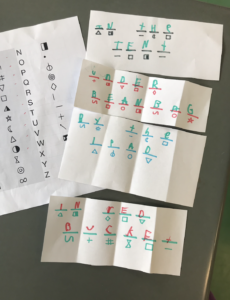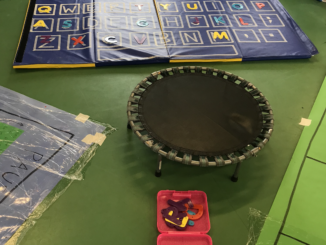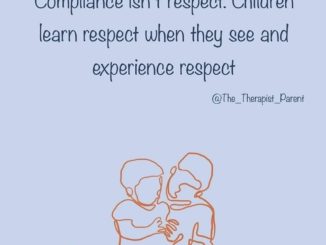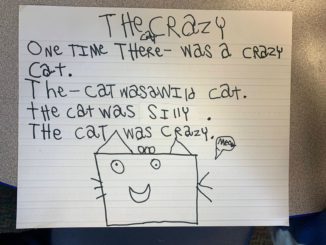I had a student recently who I wanted to give a fidget to. He already had a fidget for his classroom, but I had recently got a big bag of fidgets and found a particular one I thought he’d enjoy, that I would gift to him.
I set up a little scavenger hunt for our OT session, that I also knew he would enjoy—all of this was for the fun and love of it, not me forcing him to do anything. As with all activities in my OT room, I mentioned the scavenger hunt to him as a suggestion if he was interested. Like I predicted, he was interested and quickly began solving the coded clues.
(Actually—it feels like a necessary note here—he gushed about how excited he was for the scavenger hunt all the way from the door of his classroom to the door of my classroom. Then he instantaneously changed his mind and said “I don’t want to do that scavenger hunt” before he had even seen a clue or anything about it. And I dropped it completely. I had a moment where, in my mind, I thought about trying to coax or cajole him into doing it. But it didn’t feel honest to myself and the kind of therapy I try to do, so I let it go entirely. We played soccer for the first several minutes, and then out of nowhere, he asked, “Is it too late to do the scavenger hunt now?” And we switched and did that!)
Importantly, I didn’t tell him that the fidget was a prize at the end or even that there was a prize at the end at all. I just handed him the first coded clue and he enthusiastically began solving it.
Four clues whizzed by and he ran to the bucket that had the prize in it, wrapped in a piece of paper that said “You Win 🙂 “
He re-emerged from digging around in the bucket with the piece of paper. Unrolled it and delightedly proclaimed with pride, “YEAH! I win!!! I did it!”
I laughed a little bit and said “Wait, did you already get the fidget?”
“The what?”
“There was a prize wrapped in that paper.”
“There was?”
“Yeah—look again!”
This time he dug around in the bucket again and found the fidget that had fallen out of the paper.
After finding it, he was excited about and delighted by the fidget—which I knew he would be. Still, I couldn’t help noticing that I had—however accidentally and innocently—robbed him of the moment in which he was simply, truly, proud of himself just for completing it. He didn’t open the paper and say “That’s it?” And at no time through the process did he ask me what he was “working toward” or know anything about an external motivator.
He did it because he loved it. He pushed through challenge because it was just the right amount of challenge for him, and because he had spent the first 15 minutes of the session getting regulated first and his body was ready to tackle a fun challenge just for the love of it. And when he got to the end after hard work, he was satisfied just knowing he’d managed to complete it and it was a joyful journey.
That’s, like, exactly what I want for all of my kids. (And your kids! And you!)




